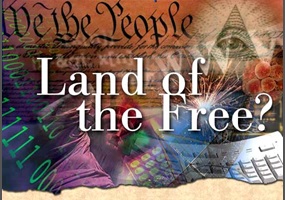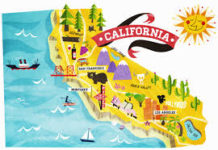Does America still provide some kind of positive promise to the rest of the world? Did America ever provide such promise? We used to believe the answer was yes, and we believed that almost universally, across the board. Today, many Americans reject the notion of American Exceptionalism, and view the United States as a great mistake – a country that was founded on and is steeped in oppression, and genocide. These Americans would call the United States a peril, and one the world would be better off without, and it is because of these Americans that the promise of America is in peril. I’d like to take a quick look back in history to show both the promise, and the peril, of America.
 During the Revolutionary War, the Continental Army would often engage the British Army, and use sharpshooters to systematically take out British officers. Cornwallis was so distraught with this tactic that he sent an envoy to General Washington, with a message that said, “This tactic of systemically aiming munitions at officers must end. Imagine an army devoid of officers, in which the men are free to roam as they naturally do, without officers of noble birth to restrain them. Surely you agree that the common man must at all times be controlled“ (emphasis mine).
During the Revolutionary War, the Continental Army would often engage the British Army, and use sharpshooters to systematically take out British officers. Cornwallis was so distraught with this tactic that he sent an envoy to General Washington, with a message that said, “This tactic of systemically aiming munitions at officers must end. Imagine an army devoid of officers, in which the men are free to roam as they naturally do, without officers of noble birth to restrain them. Surely you agree that the common man must at all times be controlled“ (emphasis mine).
Unfortunately for Cornwallis, General Washington was fighting a revolution not only against English tyranny, but also against the notion that a moral and intellectual elite (the ‘nobility’ in his day) needed to control everyone else.
The prevailing economic system of the time was one in which government, through a king and noble lords (representing a moral and intellectual elite), owned and operated the means of production for the people. The noble Lords owned everything on their lands, including the people, and took everything their people produced, on the promise that enough would trickle back down to the people who produced it for them to survive. In the late 1700s, 90% of the population of England lived in conditions not materially different from those of a Roman slave, and England was the richest nation on Earth. Life at this time was brutal and short, with 90% of the public always but one bad harvest from starvation. Thomas Malthus, the first full-time economist, noted that populations always grew faster than food supplies, and that the misery of poverty and hunger would continue forever. Looking backward, Thomas Malthus was right.
But then something changed.
Suddenly the notion that the commoner needed to be ruled by a moral and intellectual elite came into question. For the first time in human history, the king was told he did not own his subjects, the feudal lord did not own the people who lived on his property, and the people were free to do as they wished with their productive capacities.
They generally sold their labor to the highest bidder.
This shift to looking at regular people as being in charge of their own lives, with a government whose primary role was to protect them against aggression, and to ensure that all exchanges are voluntary, led to the greatest expansion in living and working conditions, especially for the lowest skilled workers, at that time in human history.
The United States followed suit shortly thereafter, and growth in the United States was even more dramatic, owed largely to our lack of a caste system. Ours was a libertarian society, founded with the Constitution. Our was however an imperfect libertarian society, allowing Southern states to maintain an anti-libertarian system of slavery, for another 80 years.
Interestingly, all of the per capita GDP growth for that first 80 years was in the North. All of it. The South stayed as poor, per capita, as it had been in 1789, until after the Civil War, when slavery ended.
There is a reason the North exploded into an economic power during the pre-civil war era, and the South did not: the South still used a system of lords and laborers, while in the North everyone was free to sell their labor to the highest bidder.
After the end of slavery, the South expanded too, and though the South still has not caught up to the North (even today), we became, by the start of World War One, the largest, richest, most powerful country the world had ever seen, with the highest standards of living ever imagined
Had you told General Cornwallis that the United States would be, in just over 100 years, stronger economically than not only England, but all of Europe combined, he would have had a good laugh. And yet, it happened.
That is the growth, and the promise of the United States. This is why so many people have, and continue to, immigrate to our shores.
Just as the United States emerged as the world’s preeminent economic power, progressivism emerged with the idea that if we could only create a moral and intellectual elite, and give them control over the people, we could do even better. Government spending has since grown from less than 3% of GDP to more than 40% (including federal, state, and local spending). The notion has been that, if we just give government more of what we earn, then after government is done spending, including on its own wages and benefits, enough of it will trickle back down to the rest of us, for us to have better lives than if we simply kept what we earned.
The more government has taken, the more growth has slowed, and the more growth slows, the more progressives blame free markets for the slowdown, telling us that the problem is not that we give 40% of everything we make to government, but that we give only 40%.
To make matters worse, when World War Two ended we had tax rates as high as 92%, and, being the only industrial power in the world not bombed into oblivion, our economy had robust growth anyway. Progressives point to this post-war boom as proof that their policies (which failed miserably until after the war and then began to fail again in the 1970s and 1980s), work. The fact that these policies are failing today does not faze the liberal: as always, the solution to failure is for government to take more.
How much ‘more’ is enough? I have never heard an answer to that. Historically, economies collapse before the progressive reaches ‘enough’.
The promise of America is still found in our founding principles of limited government and maximum liberty. The promise of America is to finally extend these ideals to ALL Americans, and to become the ‘beacon of liberty’ our founders intended for us to be. The peril to America is that many of us no longer believe in these ideals, but instead want to return to the world General Cornwallis grew up in, where a moral and intellectual elite control us, like oxen plowing fields.
To the progressive, you are either a lord or a serf, and there can be only so many lords.
Remember that come this next election.

























